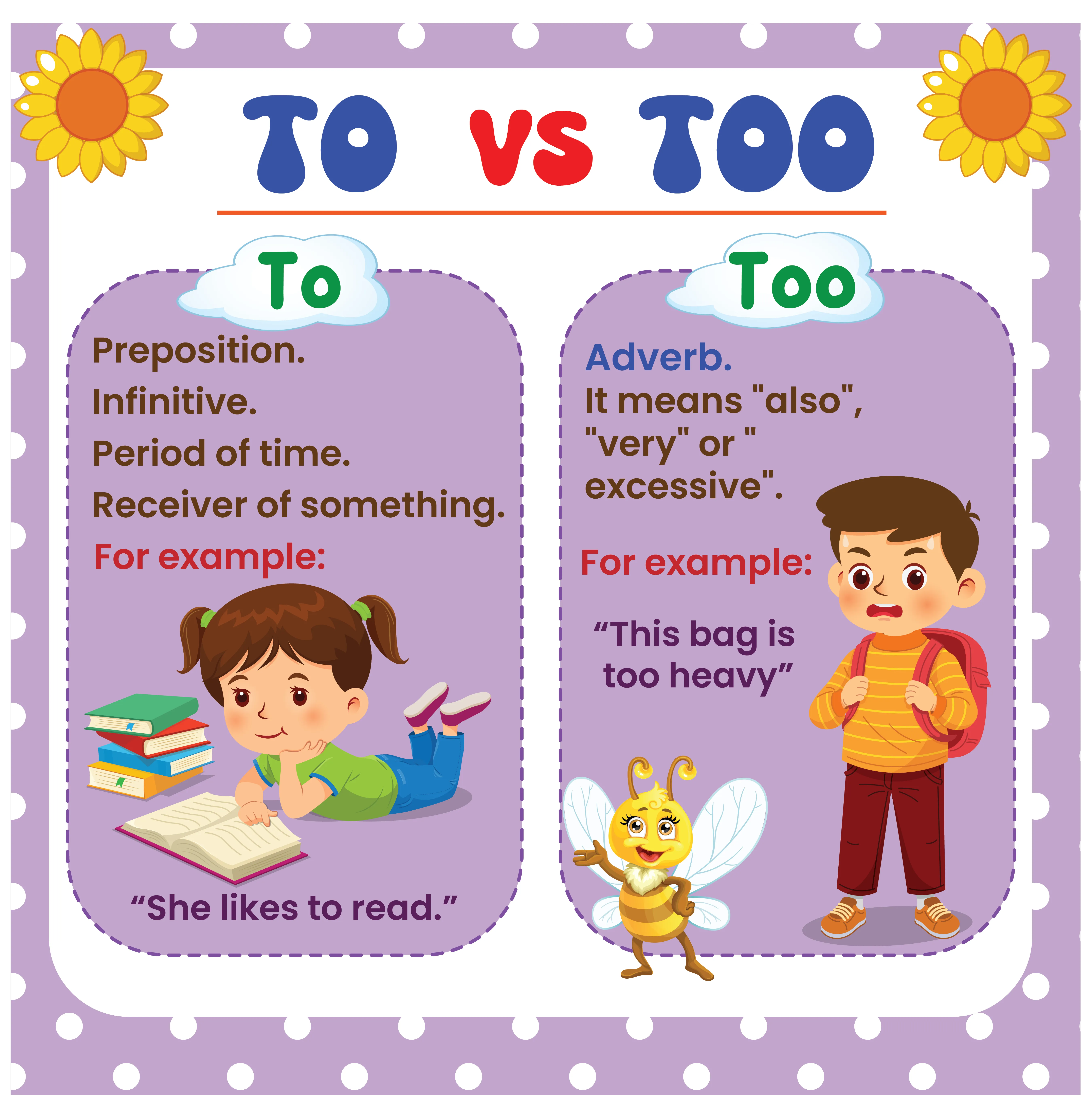
To vs Too: While learning English, many of us often get confused between the words "to" and "too." Even though they sound the same, their meanings and usage are different. The word to is used in many ways, like showing direction, giving something, or connecting ideas.
On the other hand, too usually means "also" or "more than needed." Learning the difference between to and too helps us write better sentences and avoid grammatical mistakes in English. So, keep reading to explore the to vs too differences with easy examples.
To vs Too- Understanding the Difference Between To and Too
When learning about to vs too, it is important to know how each word works in a sentence. The word "to" is mostly used as a preposition that shows direction or movement.
-
For example, in the sentence “They are going to the park,” "to" shows where they are going. It is also used before verbs to make an infinitive form, like “She likes to read.”
The difference between to and too is clear when we learn about "too." The word "too" is an adverb that means “also,” “in addition.” or "more than."
-
For example, “I want to come too” means “I also want to come.” When we say, “This bag is too heavy,” it means the bag is very heavy or more than comfortable.
It is important to remember that "to" shows direction or connects verbs, while "too" talks about something extra or additional. This simple rule will help students use "to vs too" correctly in writing and speaking. Let’s now learn about To vs Too usage in English.

Read More: List of Five Letter Words in English
How to Use To
The word "to" is a small but very useful word in English. It is mostly used as a preposition to show direction or where someone or something is going. For example, when we say, “I am going to school,” "to" shows the place of arrival or goal.
-
"To" is also used before verbs to make the infinitive form, like “to play,” “to eat,” or “to study.” This helps connect actions in a sentence.
-
Apart from direction and verbs, "to" can show a relationship between things, such as possession or connection. For example, “This book belongs to me” or “She is kind to her friends.” It can also talk about a range of time or numbers, like “It takes five to ten minutes to finish.”
Read More: Tense Chart
How to Use Too
Unlike "To", "Too" is not a preposition. Instead, it is used to mean “also,” “in addition,” or “besides.” For example, we can say, “We want to go too,” which means I want to go as well.
-
"Too" is also used to show that something is more than needed or is excessive. For example, “The soup is too hot” means the soup is hotter than what is comfortable.
-
Sometimes, we also use "Too" to mean “very” when speaking casually, like saying, “That movie is too funny!” This means the movie is very funny.
Read More: Three Letter Words in English
To vs Too Synonyms
Though "to" and "too" are pronounced similarly, they have very different roles in sentences. Knowing their synonyms can help use them correctly.
-
Some synonyms of "too" are excessively, overly, also, additionally, and furthermore. For example, “She is too tired” means she is excessively tired, and “I want to come too” means also.
-
The synonyms for "to" include toward, into, for, until, and with. For example, “We are going to school” shows movement toward a place.
Why are To and Too Homophones?
To and Too are homophones because they sound exactly the same when spoken. Along with the word two (the number), these three words have the same pronunciation but have very different meanings and uses. This is why many students and even native speakers sometimes confuse them.
Homophones are common in English and can cause mistakes in writing if we don’t pay close attention. Even though to, too, and two sound alike, their spellings and meanings are different, so it is important to learn when and how to use each word correctly.
Read More: Opposite Words
Different Use of To and Too
The words "to" and "too" are used in many ways. Even though they sound alike, they have different uses for different purposes in sentences, as explained here:
Different Use of To:
-
To show direction or place:
He went to the fair.
("To" tells us where he went.) -
To show time or range:
School is open from Monday to Friday.
("To" marks the time from start to end.) -
To show a result or growth:
The seeds turned to beautiful flowers in spring.
(Here, "to" shows the change from seeds to flowers.) -
To show connection:
The key is tied to the bag.
("To" connects the key and the bag.) -
To show comparison or choice:
I prefer apples to bananas.
("To" shows a choice between two things.)
-
To describe amounts or rates:
The score was 3 to 2.
(Here, "to" shows the score ratio.) -
To show who receives something:
She gave the letter to her teacher.
("To" shows who got the letter.) -
To show who or what is affected:
Why did you say that to him?
("To" tells us who the action is aimed at.)
Different Uses of Too:
-
To show something is more than needed:
This laptop is too heavy.
("Too" shows extra weight.) -
To add something extra:
She wants to play, too.
("Too" means also.) -
To show phrases with strong meaning:
It’s too late to go now.
(Used in phrases like "too late," "too bad," or "too long.")
Also Read: Article Writing
To vs Too Examples
It can be confusing to know when to use to or too, but with the help of examples, it becomes much easier to understand. Here are some to vs too examples with simple explanations:
Examples of To:
-
I am going to the park.
(Here, "to" shows the direction or place.) -
He gave a book to his friend.
(In this sentence, "to" tells us who received the book.) -
We need to finish our homework.
("To" is used before the verb "finish" to make it an action.) -
She wants to learn how to swim.
(Here, "to" comes before the verbs "learn" and "swim.") -
This game is easy to play.
("To" connects the words "easy" and "play.")
Examples of Too:
-
This purse is too beautiful to use every day.
(Here, "too" means so beautiful that it doesn’t feel right to use it daily.) -
I want to come too.
("Too" means "also" or "as well.") -
He is too tired to study.
("Too" shows that he is very tired—more than usual.) -
That movie was too long.
("Too" means the movie’s length was more than expected or needed.) -
She cried too loudly.
(Here, "too" means she cried more loudly than needed.)
Read More: Months Name in English
To or Too Examples with Answers
-
I want ___ go to the park today.
-
The water is ___ cold for swimming.
-
She gave her notebook ___ the teacher.
-
We are going ___ the zoo tomorrow.
-
He ate ___ many sweets and felt sick.
Answers:
-
To
-
Too
-
To
-
To
-
Too
Read More: Words that Start With A
Enhance Your Child's English Grammar with CuriousJr
Is your child also getting confused while using simple grammar in writing or speaking? This is common when children are just starting to learn English grammar.
To make learning simpler for your child, CuriousJr’s Online English Learning Classes are designed to make grammar easy to understand and fun to learn.
-
With the help of live interactive sessions, dedicated teachers, and regular practice, your child can improve his or her grammar skills step by step.
-
These classes also include guided homework support, progress tracking, and regular PTMs so that you can stay updated on your child’s growth.
Book a demo class today and see how CuriousJr can help your child become better and more confident in English.
To vs Too FAQs
Q.1. When do you use too in a sentence?
Q.2. What is the main difference between to and too in grammar?
Q.3. I had to or too, which is correct to use?
Q.4. To vs too vs two, what is the difference?


